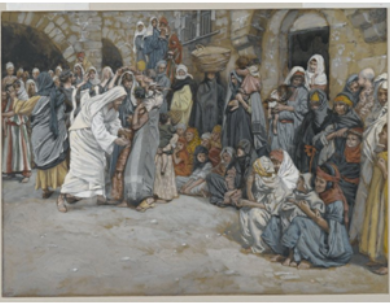“And
they
were
bringing
children
to
Him
so
that
He
might
touch
them;
and
the
disciples
rebuked
them.
But
when
Jesus
saw
this,
He
was
indignant
and
said
to
them,
‘Permit
the
children
to
come
to
Me;
do
not
hinder
them;
for
the
kingdom
of
God
belongs
to
such
as
these.
…’
And
He
took
them
in
His
arms
and
began
blessing
them,
laying
His
hands
upon
them”
(Mark 10:13-16).
“He Took Them in His Arms”
No
sign
of
personal
affection
is
more
convincing
than
the
human
touch.
When
people
are
emotionally
moved,
they
even
speak
of
themselves
as
being
“touched.”
A
simple
telephone
call
is
spoken
of
as
reaching
out
and
“touching
someone.”
Hymns
such
as
“The
Touch
of
His
Hand
on
Mine”
and
“Safe
in
the
Arms
of
Jesus”
speak
of
the
reassuring
sense of the Savior’s presence.
In
the
early
1990’s,
stories
about
the
conditions
of
children
abandoned
to
state
care
facilities
came
out
of
Romania
after
the
fall
of
its
Communist
government.
Whether
by
indifference
or
inadequacy,
the
staffs
left
these
children
to
languish
in
their
beds
without
any
attention,
except
to
get
food
and,
perhaps,
a
change
of
clothing.
Day
after
day,
they
were
neglected
and
untouched,
and
without
anything
which
might
pass
for
personal
or
social
interaction.
As
a
result,
their
brains
were
underdeveloped
and
the
children
suffered
severe
mental
and
emotional
difficulties
which
left
them
unable
to
form
ordinary
emotional
attachments.
From
sad
and
tragic
incidents
such
as
this,
scientists
and
pediatricians
have
learned
how
critical
it
is
to
the
normal
mental,
emotional,
and
social
development
of
children
for
them
to
be
touched,
cuddled,
and
generally shown physical attention and maternal affection.
The
restrictions
on
physical
contact
imposed
by
the
Corona
virus
pandemic
have
served
as
a
reminder
of
the
important
role
touch
plays
in
social
interaction.
Who
would
have
thought
that
people
would
miss
and
even
crave
something
as
simple
as
a
hug
or handshake?
From
a
Biblical
standpoint,
this
should
not
be
so
surprising.
People
in
many
modern
cultures
are
more
restrained
in
physical
expressions
of
affection,
but
this
was
not
as
true
in
the
Bible.
As
odd
as
it
sounds,
Biblical
characters
are
said
to
have
fallen
on
each
other’s
necks
in
displays
of
love
(Gen.
33:4;
45:14;
46:29).
A
typical
closing
in
Paul’s
letters
was,
“Greet
one
another
with
a
holy
kiss”
(Rom.
16:16,
etc.).
Luke
describes
a
particularly
moving
scene
of
Paul
as
he
was
departing
from
the
Ephesian
elders
for
what
they
thought
was
the
last
time:
“And
they
began
to
weep
aloud
and
embraced
Paul,
and
repeatedly
kissed
him,
grieving
especially
over
the
word
which
he
had
spoken,
that
they should see his face no more … .” (Acts 20:37,38).
On
one
occasion,
the
apostles
rebuked
those
who
brought
children
to
Jesus
for
Him
to
touch.
Perhaps
they
thought
that
One
whose
divinity
they
had
just
seen
in
the
dazzling
display
of
the
transfiguration
(Mk.
9:2-8)
could
not
be
troubled
in
the
pursuit
of
His
very
important
work
by
something
so
trite
as
interaction
with
children.
When
Jesus
saw
what
the
apostles
were
doing,
He
became
angry
and
told
them
to
let
the
children
come
to
Him.
Then,
He
took
the
children
into
His
arms
and
blessed
them,
laying
His
hands
on
them
(10:13-16).
There
is
something
especially
endearing
in
the
scene
of
God
Himself,
in
the
person
of
Jesus,
taking
children
into
His
arms.
Perhaps
this
casts
light
on
why,
though
He
need
not
have
done
so,
it
was
often
the
case
that
Jesus
touched
the
sick
when
He
healed
them.
It
must
have
been
especially
meaningful
to
the
outcast
leper,
for
instance,
when
“He
stretched
out
His
hand
and
touched
him,
saying,
‘I
am
willing;
be
cleansed’”
(Matt.
8:3).
His
touch
seems
to
have
said
that
it
was
not
only
that
He
was
healing
them,
but
that
He
was
doing
so
out
of
genuine
love
and
affection
for
them.
No
doctor ever had a better “bedside manner” than “the Great Physician.”
May
there
never
be
a
time
when
a
handshake
or
hug
is
ever
taken
for
granted
or
abused by God’s people.








“And
they
were
bringing
children
to
Him
so
that
He
might
touch
them;
and
the
disciples
rebuked
them.
But
when
Jesus
saw
this,
He
was
indignant
and
said
to
them,
‘Permit
the
children
to
come
to
Me;
do
not
hinder
them;
for
the
kingdom
of
God
belongs
to
such
as
these.
…’
And
He
took
them
in
His
arms
and
began
blessing
them, laying His hands upon them”
(Mark 10:13-16).
“He Took Them in His Arms”
No
sign
of
personal
affection
is
more
convincing
than
the
human
touch.
When
people
are
emotionally
moved,
they
even
speak
of
themselves
as
being
“touched.”
A
simple
telephone
call
is
spoken
of
as
reaching
out
and
“touching
someone.”
Hymns
such
as
“The
Touch
of
His
Hand
on
Mine”
and
“Safe
in
the
Arms
of
Jesus”
speak
of
the
reassuring
sense
of the Savior’s presence.
In
the
early
1990’s,
stories
about
the
conditions
of
children
abandoned
to
state
care
facilities
came
out
of
Romania
after
the
fall
of
its
Communist
government.
Whether
by
indifference
or
inadequacy,
the
staffs
left
these
children
to
languish
in
their
beds
without
any
attention,
except
to
get
food
and,
perhaps,
a
change
of
clothing.
Day
after
day,
they
were
neglected
and
untouched,
and
without
anything
which
might
pass
for
personal
or
social
interaction.
As
a
result,
their
brains
were
underdeveloped
and
the
children
suffered
severe
mental
and
emotional
difficulties
which
left
them
unable
to
form
ordinary
emotional
attachments.
From
sad
and
tragic
incidents
such
as
this,
scientists
and
pediatricians
have
learned
how
critical
it
is
to
the
normal
mental,
emotional,
and
social
development
of
children
for
them
to
be
touched,
cuddled,
and
generally
shown physical attention and maternal affection.
The
restrictions
on
physical
contact
imposed
by
the
Corona
virus
pandemic
have
served
as
a
reminder
of
the
important
role
touch
plays
in
social
interaction.
Who
would
have
thought
that
people
would
miss
and
even
crave
something as simple as a hug or handshake?
From
a
Biblical
standpoint,
this
should
not
be
so
surprising.
People
in
many
modern
cultures
are
more
restrained
in
physical
expressions
of
affection,
but
this
was
not
as
true
in
the
Bible.
As
odd
as
it
sounds,
Biblical
characters
are
said
to
have
fallen
on
each
other’s
necks
in
displays
of
love
(Gen.
33:4;
45:14;
46:29).
A
typical
closing
in
Paul’s
letters
was,
“Greet
one
another
with
a
holy
kiss”
(Rom.
16:16,
etc.).
Luke
describes
a
particularly
moving
scene
of
Paul
as
he
was
departing
from
the
Ephesian
elders
for
what
they
thought
was
the
last
time:
“And
they
began
to
weep
aloud
and
embraced
Paul,
and
repeatedly
kissed
him,
grieving
especially
over
the
word
which
he
had
spoken,
that
they
should see his face no more … .” (Acts 20:37,38).
On
one
occasion,
the
apostles
rebuked
those
who
brought
children
to
Jesus
for
Him
to
touch.
Perhaps
they
thought
that
One
whose
divinity
they
had
just
seen
in
the
dazzling
display
of
the
transfiguration
(Mk.
9:2-8)
could
not
be
troubled
in
the
pursuit
of
His
very
important
work
by
something
so
trite
as
interaction
with
children.
When
Jesus
saw
what
the
apostles
were
doing,
He
became
angry
and
told
them
to
let
the
children
come
to
Him.
Then,
He
took
the
children
into
His
arms
and
blessed
them,
laying
His
hands
on
them
(10:13-16).
There
is
something
especially
endearing
in
the
scene
of
God
Himself,
in
the
person
of
Jesus,
taking
children
into
His
arms.
Perhaps
this
casts
light
on
why,
though
He
need
not
have
done
so,
it
was
often
the
case
that
Jesus
touched
the
sick
when
He
healed
them.
It
must
have
been
especially
meaningful
to
the
outcast
leper,
for
instance,
when
“He
stretched
out
His
hand
and
touched
him,
saying,
‘I
am
willing;
be
cleansed’”
(Matt.
8:3).
His
touch
seems
to
have
said
that
it
was
not
only
that
He
was
healing
them,
but
that
He
was
doing
so
out
of
genuine
love
and
affection
for
them.
No
doctor
ever
had
a
better
“bedside
manner”
than
“the
Great
Physician.”
May
there
never
be
a
time
when
a
handshake
or
hug
is
ever taken for granted or abused by God’s people.







